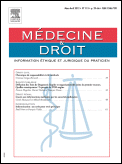
Medecine & Droit
Scope & Guideline
Fostering Interdisciplinary Dialogue in Medicine and Law
Introduction
Aims and Scopes
- Bioethics and Medical Ethics:
The journal addresses ethical dilemmas in medical practices, including in vitro fertilization, artificial intelligence in healthcare, and end-of-life decisions, highlighting the ethical considerations that healthcare professionals must navigate. - Legal Frameworks in Healthcare:
It analyzes the legal implications of medical practices, including medical liability, patient consent, and the rights of minors in medical decisions, providing a comprehensive understanding of how laws impact healthcare delivery. - Interdisciplinary Approach:
The journal promotes an interdisciplinary approach by integrating perspectives from law, medicine, and ethics, enabling a holistic understanding of complex health-related issues. - Emerging Health Technologies:
The impact of new technologies such as artificial intelligence and genetic testing on healthcare practices and legal responsibilities is a significant focus, exploring how these advancements challenge existing legal frameworks. - Health Policy and Regulation:
It examines the implications of health policies, including those related to public health crises like COVID-19, and their legal ramifications, thereby informing policymakers and practitioners.
Trending and Emerging
- Artificial Intelligence in Healthcare:
There is a growing emphasis on the implications of artificial intelligence in medicine, exploring ethical considerations, legal responsibilities, and the impact on patient care, reflecting the rapid integration of technology in healthcare. - End-of-Life Issues and Patient Rights:
Recent publications show a heightened focus on end-of-life care, including legal and ethical questions surrounding minors and consent, indicating a societal shift towards more nuanced discussions about patient autonomy and rights. - Bioethical Implications of Longevity and Immortality:
The exploration of bioethical and ecological issues related to the longevity and immortality industry is emerging as a significant theme, reflecting societal concerns about health, ethics, and the future of medical interventions. - Health Data Protection and Digital Ethics:
As healthcare increasingly intersects with digital technologies, discussions surrounding data protection, privacy, and ethical considerations in research are trending, emphasizing the importance of safeguarding patient information in the digital age. - Legal and Ethical Challenges of Genetic Testing:
The journal is increasingly addressing the legal and ethical implications of genetic testing, particularly in relation to consent and the responsibilities of healthcare providers, highlighting the complexities introduced by advancements in genetics.
Declining or Waning
- Traditional Medical Liability Cases:
There is a noticeable decline in papers focusing on traditional medical malpractice cases. This shift may indicate a move towards more complex issues involving technology and ethics rather than standard liability discussions. - Historical Perspectives on Medical Law:
Themes involving historical analyses, such as the evolution of medical law from antiquity, are appearing less frequently, suggesting a decreased interest in retrospective studies in favor of contemporary issues. - Basic Medical Ethics:
Basic discussions around fundamental medical ethics appear to be waning, as the journal increasingly concentrates on more nuanced and complex ethical dilemmas related to new medical technologies and societal changes.
Similar Journals

ISSUES IN LAW & MEDICINE
Bridging the Gap Between Law and MedicineISSUES IN LAW & MEDICINE, published by the NATIONAL LEGAL CENTER MEDICALLY DEPENDENT & DISABLED INC, serves as a vital resource within the intersecting realms of legal and medical discourse. With an ISSN of 8756-8160, this journal has been in circulation since 1985 and continues to provide insights and analyses relevant to both health policy and the ethical implications of medical practice. Despite its categorization in the fourth quartile among peers, it remains a crucial platform for exploring underrepresented issues that affect medically dependent and disabled populations. Each issue aims to contribute to knowledge and inform practice in areas such as ethics, legal considerations, and health care policy, promoting greater understanding among researchers, professionals, and students alike. While access is not open, the journal's ongoing commitment to addressing complex topics positions it as a relevant source for those dedicated to advancing the conversation at the intersection of law and medicine.

EUROPEAN JOURNAL OF HEALTH LAW
Illuminating the path to effective health governance.The European Journal of Health Law, published by Brill, stands as a pivotal resource for scholars and practitioners at the intersection of health policy and law since its inception in 1994. This esteemed journal, with an ISSN of 0929-0273 and an E-ISSN of 1571-8093, delves into pressing issues affecting health law across Europe and beyond, providing a platform for rigorous scholarly discourse. It is categorized in the Q4 quartile for Health Policy and Q3 for Law, highlighting its crucial role in advancing knowledge in these fields. While the journal is not an open-access publication, its content remains vital for researchers, students, and professionals seeking to navigate the complexities of health law amidst evolving legal frameworks. With an increasing focus on interdisciplinary studies, the journal aims to foster a deeper understanding of legal principles and their application to health care governance, policy-making, and ethical considerations, making it an indispensable reference for those committed to enhancing health law practice and scholarship.
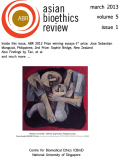
Asian Bioethics Review
Navigating the Complexities of Health EthicsAsian Bioethics Review, published by SPRINGER, is a premier journal indexed with ISSN 1793-8759 and E-ISSN 1793-9453, dedicated to advancing discourse in the interdisciplinary field of bioethics across Asia and beyond. Established in 2015, this esteemed publication has rapidly gained recognition, achieving a Q1 ranking in Philosophy and Q2 in key categories such as Health Policy and Issues, Ethics and Legal Aspects in 2023. With its robust Scopus rankings highlighting its significance across diverse domains—including a remarkable 98th percentile ranking in Philosophy—the journal serves as a vital platform for researchers, ethicists, and policymakers to explore pressing ethical issues and contribute to policy development in health and social sciences. Although not open access, the journal ensures a wide reach through institutional subscriptions, making it an essential resource for students and professionals committed to ethical practices in healthcare. Set in the dynamic backdrop of Singapore, "Asian Bioethics Review" continues to shape the conversation around bioethical practices in the Asian context and globally.

MEDICINE SCIENCE AND THE LAW
Unraveling Complexities in Medicine, Science, and LawMEDICINE SCIENCE AND THE LAW is a prestigious journal published by SAGE PUBLICATIONS INC, focused on the intersection of law, health policy, and ethical issues as they pertain to medicine. With a long-standing history dating back to 1960, this journal has become a crucial platform for scholars and professionals alike to share and disseminate research that shapes the evolving legal landscape surrounding health care practices. It holds notable positions in the academic community, ranking in the Q3 category for Health Policy and Issues, Ethics and Legal Aspects, and achieving a distinguished Q1 ranking in Law as of 2023. With rigorous peer-review standards and a commitment to publishing high-quality research, MEDICINE SCIENCE AND THE LAW is invaluable for those exploring the critical legal challenges and ethical dilemmas faced within the healthcare sector. Research contributions are vital for informing policy and practice, ensuring that the journal remains a relevant and essential resource for researchers, practitioners, and students dedicated to the intersection of law and medicine.
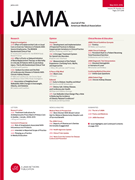
JAMA-JOURNAL OF THE AMERICAN MEDICAL ASSOCIATION
Connecting healthcare professionals through groundbreaking research.JAMA - Journal of the American Medical Association, published by the American Medical Association, stands as a leading voice in the field of medicine, with an impressive impact factor that reflects its status as a pivotal resource for health professionals. Established in 1883, JAMA has consistently evolved to meet the changing landscape of medical research and practice, converging its insights into the realm of general medicine through to 2024. As a Q1 journal in the Medicine (miscellaneous) category, JAMA ranks notably at #6 out of 636 in Scopus, placing it within the 99th percentile of its field. Although it does not currently offer open access options, JAMA remains a critical platform for disseminating groundbreaking research and clinical studies, facilitating engagement among researchers, healthcare professionals, and students alike. Its commitment to advancing health knowledge makes it an indispensable asset for anyone dedicated to the pursuit of excellence in medical science.
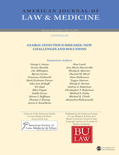
AMERICAN JOURNAL OF LAW & MEDICINE
Shaping the Future of Healthcare through Legal InsightAMERICAN JOURNAL OF LAW & MEDICINE is a prestigious interdisciplinary journal published by Cambridge University Press that bridges the critical intersection of legal and medical scholarship. Since its inception in 1975, this journal has fostered scholarly dialogue surrounding complex legal issues affecting health care and medical ethics, significantly contributing to the fields of law and the social sciences. With its current impact factor highlights showcasing a Q2 ranking in Law and Q3 in Health (Social Science), along with a solid readership base, the journal appeals to researchers, legal professionals, and students alike, offering a platform for impactful research and case studies. Although it does not currently provide Open Access options, the journal continues to prioritize rigorous peer-reviewed content, ensuring that essential discussions on law and medicine remain accessible to its readership. By engaging with contemporary legal and medical issues, the AMERICAN JOURNAL OF LAW & MEDICINE plays a vital role in advancing knowledge and shaping practices within these dynamic fields.

Review of European and Comparative Law
Bridging Legal Borders through Insightful ScholarshipThe Review of European and Comparative Law, published by the John Paul II Catholic University of Lublin, serves as a prominent platform for interdisciplinary scholarship within the realm of legal studies. Since its establishment in 2016 as an Open Access journal, it has made significant strides in disseminating pivotal research that explores the intricate relationship between European and comparative legal systems. Aimed at fostering a deeper understanding of legal principles across differing jurisdictions, this journal provides an invaluable resource for researchers, legal practitioners, and students alike. By offering free and unrestricted access to its content, the journal not only enhances the visibility of groundbreaking legal scholarship but also encourages global discourse on contemporary legal issues. With a commitment to high-quality research and a growing repository of scholarly articles, the Review of European and Comparative Law is an essential read for those engaged in the dynamic field of law.

THEORETICAL MEDICINE AND BIOETHICS
Advancing Critical Discourse in Healthcare Ethics.THEORETICAL MEDICINE AND BIOETHICS, published by SPRINGER, is an esteemed journal dedicated to exploring the complex intersections of medicine, ethics, and law. With its ISSN 1386-7415 and E-ISSN 1573-1200, this journal serves as a vital platform for scholars, practitioners, and students interested in the ethical implications of medical practices and innovations. Although it currently holds a Q4 impact factor in the categories of Issues, Ethics and Legal Aspects and Medicine (Miscellaneous) as of 2023, its relevance is amplified by its commitment to fostering critical discourse in a rapidly evolving field. The journal features a diverse range of articles that address profound ethical dilemmas in healthcare, making it a significant resource for contemporary research from 1997 to the present. As an open-access journal, it ensures that cutting-edge knowledge is readily available, inviting contributions that challenge conventional thought and advance the field of bioethics.

BioLaw Journal-Rivista di Biodiritto
Advancing Ethical Discourse in BiolawBioLaw Journal-Rivista di Biodiritto, published by UNIV TRENTO, FAC LAW, stands as a vital interdisciplinary platform in the domains of biolaw, biotechnology, and health policy. With an ISSN of 2284-4503 and a burgeoning reputation, this journal encourages critical discussions surrounding the ethical, legal, and social implications of biotechnological advancements from 2014 to 2024. Ranked Q3 in both Biochemistry and Biotechnology, alongside Q2 rankings in Law and Philosophy, it reflects a growing body of scholarship in these experimental fields. Although currently categorized with varying percentile ranks in the Scopus database, it underlines the journal's commitment to nurturing innovative research and interdisciplinary dialogue. The journal promotes open access principles, although the specific access options should be verified for each article. It serves as an indispensable resource for researchers, professionals, and students engaged in the evolving intersection of law and biotechnology, making it a key player in shaping future discourses in bioethics and policy.
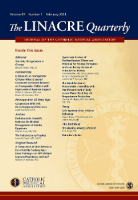
Linacre Quarterly
Fostering Interdisciplinary Conversations in HealthcareLinacre Quarterly, published by SAGE Publications Inc, is a distinguished journal that serves as an interdisciplinary platform in the fields of Health Policy and Philosophy. With an ISSN of 0024-3639 and an E-ISSN of 2050-8549, this journal has been pivotal in providing insights into the intricate dynamics of health policy through a philosophical lens since its inception in 1945. Notably, it holds a respectable 2023 Scopus rank, placing it in the 68th percentile within the Arts and Humanities (Philosophy) category and the 21st percentile in Medicine (Health Policy). Though currently not offering Open Access options, Linacre Quarterly remains committed to advancing scholarly discussion and fostering innovation among researchers, professionals, and students alike. Located in the United Kingdom, this journal continues to uphold its reputation as a vital resource for those navigating the complexities of health-related ethical dilemmas and policy-making frameworks, thereby enhancing its visibility and relevance in academic discourse.